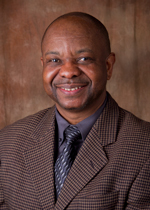After leaving Zimbabwe, a small country in Southern Africa, and teaching at two other Church of Christ universities for several years, Dr. Florah Mhlanga came to Lipscomb in August 2011 as a biology professor.
Mhlanga, one of nine children, earned her bachelor’s degree from the University of Zimbabwe before obtaining her master’s and doctorate degrees at Michigan State University. She has two children, Carl, 15, and Craig, 10, and her husband, Fortune, is director of Lipscomb’s School of Computing and Informatics.
Mhlanga said she came to the United States from Zimbabwe with her husband and their two sons in 2002 because the political and economic climate in Zimbabwe was beginning to “deteriorate.”
“We never thought we would leave Zimbabwe,” she said, noting that she was a professor and chair of her department at the University of Zimbabwe.
An opportunity arose at that time, Mhlanga said, for them to teach at Faulkner University in Montgomery, Ala., and she said she believes it was a blessing from God.
“We thought it was a God-sent opportunity to shield us from some of the problems that really we were experiencing — the political and economic problems in Zimbabwe,” she explained. “We thought it was really God’s call or a blessing, in a way, from God that he opened this avenue for us to leave Zimbabwe and to go to Alabama to work there.”
Mhlanga said the condition of the political and economic system in Zimbabwe gave her concern for her children and their ability to have opportunities.
“It was going to be very difficult to educate them, to find a good educational system for our boys. Having that in mind, really thinking about our children, thinking about the future of our children, we left Zimbabwe to come to the United States. I think as a parent you always do what you have to do for your children.”
Prior to teaching at Lipscomb, Mhlanga taught in the biology department at Faulkner for nearly five years and then in the agricultural and environmental sciences department at Abilene Christian University in Abilene, Texas, from 2007-2011.
Mhlanga and her husband both applied to Lipscomb at the same time. Mr. Mhlanga interviewed for a position in the computer science department and Mhlanga in the biology department, where she already knew Dr. Kent Gallaher from their time on staff together at ACU.
One semester into her teaching job at Lipscomb, Mhlanga was named associate dean of the College of Arts and Sciences in addition to her regular professorial duties.
Mhlanga, who is often called “Dr. M” by her students, said she likes teaching because she enjoys “the process of interacting with young minds.”
“I enjoy students,” she said. “I enjoy making a difference in the lives of our young men and women. I enjoy the process of learning together with students. But more so, I feel like it is such a responsibility to touch a student’s life in that manner. I think it’s very profound, and I like that. I am impacting a young person’s life. Not only am I impacting that person but their whole future. My fingerprints are going to be all over them, all over their children, all over their grandchildren because of this interaction that we’ve had in the classroom.”
Mhlanga said she has a high value on education and tries to teach her students to appreciate their opportunities.
“I’ve learned that education is a basic human right,” she said. “Education opens opportunities that even I myself had never thought about or imagined.
“A college degree, I tell my students, will always open doors and is something that you should never take for granted. When I reflect on where I come from, there are so many people yearning for the opportunity to go to school who don’t have the opportunity to go to school, so I always tell my students, from what I have observed, that they need to work hard and just embrace the whole process of learning and enjoy it.”
“Hard work pays,” she said. “The results are always sweet.”
Mhlanga said she wants students to understand the importance of seeking to please God more than others.
“They need to take care of their intellect, but they should never neglect their spiritual walk with God,” she said. “I think it is important to nourish the spiritual aspect of their lives. They should always have a goal in mind that whatever they do, they need to do it to bring glory and honor to God. Whenever they are working, they should do so to please God and not necessarily to seek to please a professor or friends…because once God is pleased, everything else will be taken care of.”
Mhlanga said Lipscomb’s staff doesn’t only care about students’ academics but also about their spirituality. “We are concerned about students as a whole,” she said.
“We love our students. I think at times we may not say it enough; we love the students who choose to come here to Lipscomb,” she said. “We really are concerned about them, and we want them to do well. We love our students, and we appreciate everything they do.”




Many thanks for this inspiring post about one of our own. Sister Florah you make us all ordinary Zimbabweans proud, your story captures the essence of the Zimbabwean spirit of hard work ,honest gain and the love of God Almighty which is hardly talked about in the media. May the Lord continue blessing and extending your territory.. you & your family.
Inspiring story indeed. Fortune was my IT teacher for two years at the Harare Polytechnic 1988-89. Where he is now does not surprise me at all because I could see he was a high flyer even then. Be blessed.